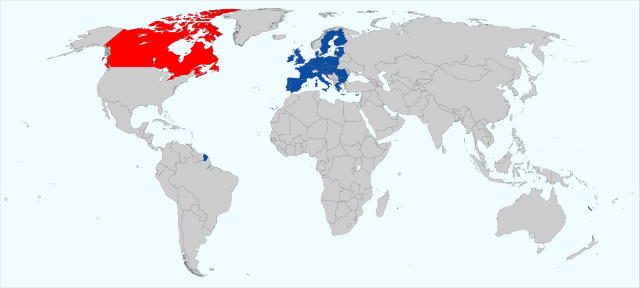The Supreme Court decision in the CETA case was very important for several reasons. The majority laid down a clear marker for the supremacy of popular sovereignty and the Constitution in our international affairs.
One of the most alarming things about the efforts of Fine Gael to have the Oireachtas ratify CETA was the attempt to pass it off as a matter of no consequence – “nothing the see here” – as demonstrated by their effort to rush ratification through Dail Eireann in 55 minutes back in late 2020. I wrote about that and the constitutional questions here at that time.
Allowing time for a Minister to propose ratification and to reply to the debate, that use of the guillotine would have left individual TDs with speaking time measured in seconds – possibly 300 seconds each for just eight TDs.
Fine Gael should bow their collective head in shame for that repugnant attempt to abuse parliament to bulldoze through without scrutiny an unconstitutional abrogation of Irish sovereignty. That party still smarts about the Crotty decision which required previous EU treaty changes to be put to the people by referendum.
Their proposed guillotine led to a coalition mini-crisis when the Greens mutinied. The Greens had successfully resisted inclusion of CETA ratification in the coalition’s programme for government.
So instead, CETA was sent to the Oireachtas joint committee on EU affairs which carefully considered the text of the proposed treaty, received evidence from expert witnesses who were questioned by committee members, and delivered a report in which the 14 TD and Senator members, including myself, split evenly on acceptance.
In the meantime, Patrick Costello TD had initiated court proceedings for a declaration that ratification of the treaty would be unconstitutional. That was his right as a TD and as a citizen; it was also his duty if he believed that the Government which is accountable to the Dáil intended violating the Constitution.
But for his trouble, Costello was roundly denounced by the supporters of ratification without scrutiny. He was told that as a government party deputy it was wrong for him to challenge the treaty in court.
The arrogance in all this still angers me. But, you know, there is nothing as close-minded and arrogant as Fine Gael euro-federalists with the bit between their teeth. Even to question their agenda is to incur instant dismissal as a euro-sceptic.
The good news is that CETA’s free trade provisions are already operational on a provisional basis and will continue in operation while member states of the EU consider whether to ratify the full treaty. Nothing of practical value in the treaty is being held up.
The better news is that Ireland can now consider whether it is possible to ratify CETA in a manner acceptable to the other parties to the treaty. I suspect that the legislative compromise proposed by some members of the Supreme Court may prove impossible to negotiate multilaterally.
For Ireland, there is very little to gain by establishing a supernational court of arbitration in which large multinational corporations can have disputes with sovereign states adjudicated in a binding fashion by a court other than their own courts.
Put bluntly, Ireland and Canada share an advantage in having domestic common law courts of the highest standard, transparency, independence, and integrity. Irish or Canadian investors have no need of protection from each other’s states institutions or legal systems. Why should Ireland now abandon such a unique selling point in international investment decision to make Canadian investors feel more confident about investing, say, in Bulgaria?
But since the CETA proposal for a supernational court was expressly canvassed as a likely precedent for other future trade agreements, we must tread carefully. Do we want to put ourselves as an independent sovereign state on a par with Elon Musk before international arbitral courts? Do we want to subject ourselves to binding interpretive jurisdiction of CETA joint committees? To whom are these answerable? Do we not trust our courts, like those of Canada, to vindicate the just entitlements of foreign investors?
There is danger in accepting freedom of international trade, free movement of capital, and freedom of commercial establishment as absolute values. Sovereign states such as Ireland are supposed to be guarantors of the common good of their own citizens and as regulators and protectors ahead of being guarantors of foreign entrepreneurs.
I have doubts about the desirability of the Supreme Court canvassing particular legislative “solutions” for CETA. It presupposes that CETA in its present form is worthy of ratification, when the Oireachtas has not opined. Even if such legislation can be negotiated nationally and internationally, has the court pre-empted its own role under article 26 or the jurisdiction of the High Court? Surely the old legal adage – “a case not argued is a case not decided” – applies here?

